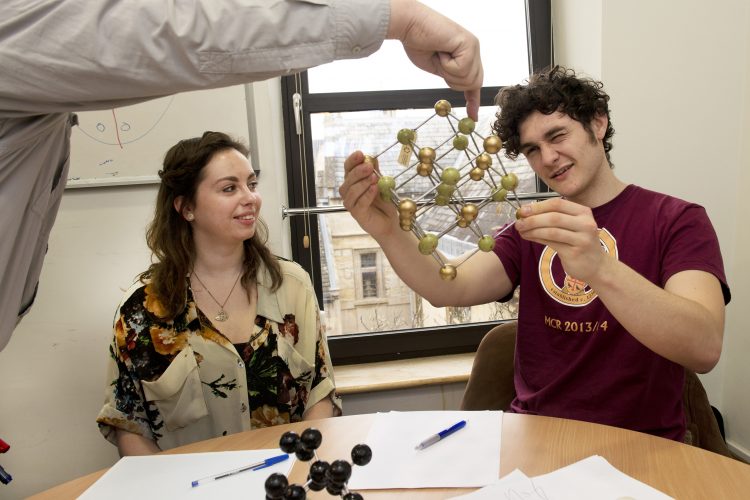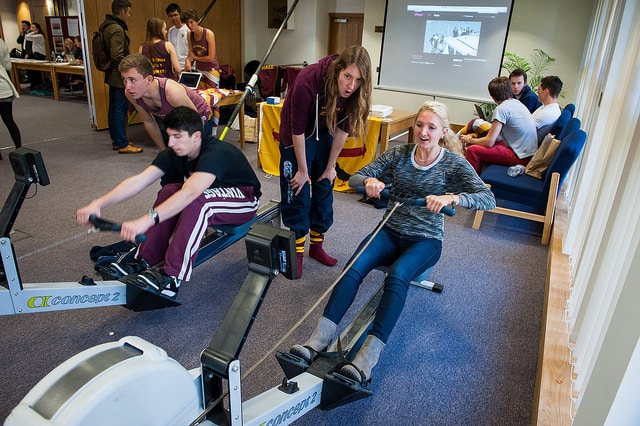Lewis – Materials Science
What do you like best about your course?
Materials science is a nice course to do. As there are currently only 36 students in total in a year, it means that you get to know everyone on the course well and it is a very social subject. There’s a lot more interaction between people from different colleges than on the larger courses. Mat Soc organises some interesting talks and offers help with getting into research or industry.
The labs are good fun and you get to use some fun stuff like liquid nitrogen. The course itself has the highest percentage of final grade marked on practical work so it’s a good course if you prefer practical work to written papers. The fourth-year Part II research project makes up a third of the final grade so that is a large piece of practical work, and there are also labs in the first three years.
As the course is quite a niche subject and quite specific, you get to go into a subject in much greater detail compared to subjects such as Engineering or Chemistry where a much wider range of content is covered.
How is your subject taught at Oxford?
There are four main parts to the teaching: lectures, labs, classes and tutorials. In first year, you will have roughly 10 hours of lectures a week. I’ve had 6 hours of labs every other week on Thursdays and Fridays; one 3-hour crystallography class every Tuesday; and usually 2 (or more) tutorials.
In first year, the course is split up into 4 sections and each section contains about 8 topics. Each topic is taught in 4 to 8 lectures over 2 to 4 weeks. Shorter topics will have only one or two tutorials on it but longer ones may have up to 4. Teddy Hall has a lot of Materials tutors so the tutorials are taken by tutors whose specialities are closest to the topic. Tutorials can be anywhere between an hour and three hours and are usually done in groups of 3 or 6. Groups of 6 only tend to happen for maths tutorials.
Crystallography classes are assessed group work where you can work with anyone from any college so are a really good way to make friends and get to know people from other colleges. Labs are done in groups of 3 from your college and are 6 hours split over two days. You then have a week to write up a 5/6-page report. Crystallography and labs make up one fifth of the first-year final grade.
What advice would you give potential applicants interested in studying your subject?
All the candidates for Materials could have also chosen to apply for Engineering or Physics and most could also have applied for Chemistry. This means that what the tutors want to see is a genuine interest in Materials: they want to know why you applied for Materials and not any other subject. For those of you who are on the fence, I do recommend Materials. It’s great fun and you get much more interaction between colleges. If you’re interested in reading about the subject, Stuff Matters is a really accessible book to read.
Why did you choose St Edmund Hall?
Teddy Hall has strong roots with Materials as the department was created at the same time as the College received its full college status. This means Teddy Hall has a very strong set of tutors who can cover a lot of specialisms.
I came and toured all the colleges that offer Materials, and I just really liked the feel of Teddy Hall. I’m very glad I did because I really enjoy the College – both its academic set up and the social side. The College has a compact main site, which is nice because it means everything is on your doorstep and people you know are always around so it’s very social as you get to see loads of people every day.
What is life like as a student here?
Oxford is a lovely city to live in. It’s large enough to have everything you could possibly need but also doesn’t feel too big. Between university societies and everything you get from being in a city, there is something for everyone. Teddy Hall is a large college in terms of numbers, which means that there are enough people to have a good number of teams and societies that cater for everyone. It’s also a very sociable college as the main Queen’s Lane site is used by everyone and all Freshers live there, which means that you bump into people all the time. Second and third years are also around a lot, which is great for getting to know people from different year groups.
What sort of extra-curricular activities are you involved in at Oxford?
Outside my studies, I play a lot of sport. I’m in the 3rd team (the Infrequents) for the University Hockey Club and am also a member of the University Eton Fives Club. I am this year’s College cricket team captain and am co-captaining the hockey team. I have also enjoyed playing occasionally for the mixed netball team, football third team and rugby second team. I also enjoy going out with my mates from time to time.
Where next?

